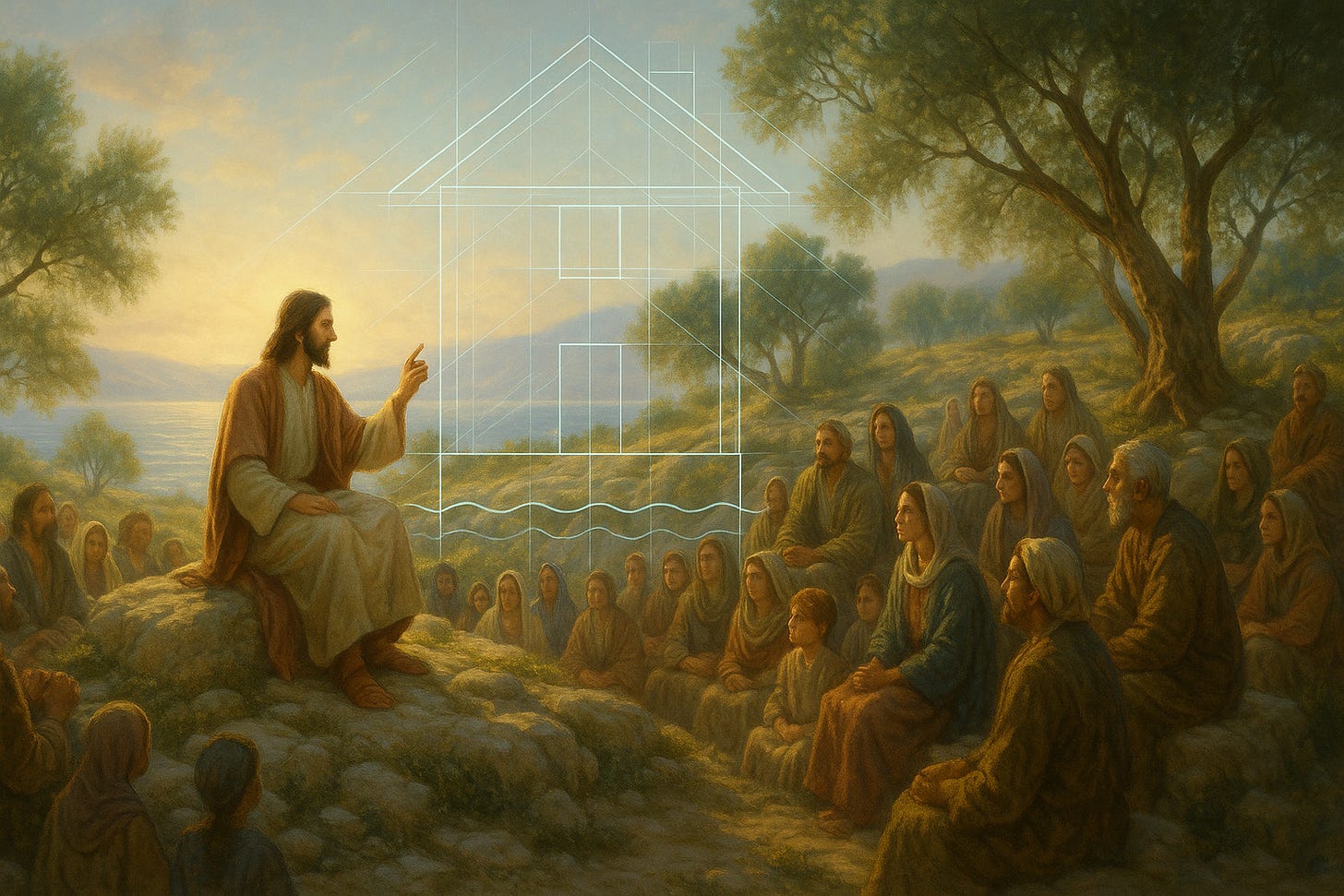The Only Happiness: The Beatitudes as Our Blueprint for Sainthood; A Reflection on the Sermon on the Mount
No one chooses the Christian life because it appeals to our human senses. We are drawn to it because of who God is and who Christ is. God is not a bigger creature among creatures. He is the One who is, the source of all being and the giver of every good. He is at once the maker of galaxies and the Father who knows your name. He is reality’s ground and light; He is origin, measure, and end. Christ is not a moral coach or a religious mascot; He is the eternal Son who took flesh, the face of the invisible God turned toward us, the living answer to what a human life is for. To live as a Christian is to live as Christ because He is the truth about God and the truth about man in one person, and only the truth can set a soul at rest.
If that is who He is, then the shocking shape of His earthly life becomes the pattern written into reality. By our standards His life is the opposite of a success story: short, poor, constrained, uncelebrated, physically demanding, marked by misunderstanding and suffering. Yet He is the happiest man who ever lived, because His life is the Beatitudes in motion; His joy is union with the Father. St. Augustine called our hearts restless until they rest in God. St. Teresa of Ávila said God alone suffices. St. John of the Cross taught that a heart filled with lesser loves has no room left for the greater. St. Thomas Aquinas called the goal of life beatitude, a complete participation in God’s own life. The Church dares to say we are made to “become partakers of the divine nature,” which means the deepest human desires for happiness, peace, and belonging are not naïve; they are signals pointing home. We often try to answer these human desires with money, power, achievement, diplomas, luxury vacations, and other worldly experiences, and perhaps for a short time those answers seem to fill the hole. Then the mirage fades and the vacancy becomes apparent again because the human heart habituates to lesser goods and was built for something more. Christ does not despise our desire for happiness; He reveals why our smaller plans cannot deliver it.
He does this by giving us the Beatitudes, which are His self-portrait and an invitation. They show what His inner life looks like and what our life can become by grace. They are not a harder law we muscle through with gritted teeth. They are the New Law, the Holy Spirit writing charity on the heart so that what God commands becomes what we actually want. The starting line is poverty of spirit; here He sets the footing for everything that follows. If God is God and I am not, then I can receive, obey, repent, and love. That is reality. From there the other dispositions make sense: meekness as strength under the Father’s hand; mourning as honest grief that opens to consolation; hunger for righteousness as the trained appetite for the Father’s will; mercy as cooperation with the medicine that saved me; purity as a single love; peacemaking as ordered powers under the reign of truth; persecution as the seal that proves the foundation is real.
If you want to learn how to live as a Christian, there’s no better place to go than to sit with Jesus on the hillside and absorb his every word as He teaches the multitude. The Sermon on the Mount is a working blueprint for real life and a real family. It provides for the pressures you’ll meet today when the daily frictions hit. When a text stings and you want to fire back, when a bill arrives and anxiety climbs, when a look from your spouse lands wrong and pride reaches for the last word. It speaks to how you handle anger in traffic, what you do with uninvited passion and desire, how you give sacrificially, how you pray consistently and honestly, how you treat the person who has made himself your enemy. Take it as instruction and you will find it orders your heart first, then your words and choices follow.
That is where we start, because the One who speaks these words is not offering advice from the sidelines; He is handing us the building code of the Kingdom. We live like Christ, not because we crave hardship, but because His way tells the truth about God and about us, and because grace makes His life possible in ours. If God is God, then the Beatitudes are not optional ideals; they are reality’s grammar. If Christ is Lord, then the happiest life is the one that shares His mind and His loves. Sit close to Him on the hillside. Let Him order your desires before you try to order your day. Ask for the Spirit who writes charity on the heart. Then take these dispositions into an ordinary day—into texts, traffic, bills, and marriage—and watch how a life begins to carry the weight it could not carry before. The Beatitudes are how Christ shares His life with us until our heart and home look like His heart and home from the inside out.
The sermon closes with a stress test. It is a picture of two houses that look fine initially then the sky opens, the torrent rises, the wind picks up, and when the storm passes only one is still standing. The difference is not schooling, money, power, or reputation; it is whether a man hears these words of Jesus and then does them. Hear without doing and the same storm that matures your neighbor will flatten you. Hear and do, and losses still come, diagnoses are still received, teenagers still push boundaries, but the frame holds because it was fastened to something stronger than your circumstances and your emotions. Jesus is deliberate when He says these words, because He means it as a whole way of life to be practiced together as a complete remodeling of your thinking—a renewal of mind and an ordering of loves. He hands you the Kingdom’s building code that is meant to outlast every storm because it is divine and eternal.
More of God does not mean less of you. God is not just bigger than you. God is Creator, the giver of being itself; He acts at a deeper level. He is the primary cause who makes secondary causes (like your mind and will) real and effective. Because He is the source of your freedom, His action does not squeeze yours; it grounds and strengthens it. Think about freedom as the capacity to know and choose the good. Sin narrows that capacity; it bends desire, clouds judgment, and makes us reactive. Grace heals and elevates it; it clarifies the mind, steadies the will, and widens the heart. That is why Scripture can say, “Where the Spirit of the Lord is, there is freedom,” and “the truth will set you free.” God’s nearness does not override your choosing; it makes authentic choosing possible. Two human agents can crowd each other out. God does not stand alongside them as one more agent; He is the reason there is anything to act at all. Aquinas puts it this way: grace does not destroy nature, it perfects it. In practice, that means God’s grace works in you so that you will and so that you act, not instead of you willing and acting.
A simple picture helps. The sun does not compete with your eyes for the job of seeing; its light makes sight possible. In a better light, your eyes see more, not less. So too with God and your freedom. Under His light, your reason judges more clearly and your will chooses more firmly. You can feel this in recovery from any entrenched sin. When you ask for grace and submit to the truth, you do not become a puppet; you become more yourself. You find that you can say no where you could not before, you can forgive when your heart used to harden, you can tell the truth without spinning it. That is not God overpowering your freedom; that is God freeing your freedom. God is not your competitor. He is the One who gives you existence, reason, and the very capacity to love. The closer you draw to Him, the more your freedom matures into what it was for in the first place—choosing the good in love.
The Sermon on the Mount contains the core truths and guidelines that shape a soul from the inside out by training our hands, schedules, and wallets to match. This is formation that happens by repeated small obediences that feel unimpressive yet transform into strength. Start where resistance is most pronounced in your life. If reconciliation is the line that catches, go to the person you avoid and make the first move. If secrecy in prayer rubs your conscience, shut the door for ten quiet minutes and look for other ways to lessen your outward piety and grow your hidden acts of worship. If generosity without recognition is the muscle you need to work out, give to someone who cannot return the favor and tell no one. Put one sentence from the sermon into your calendar today and do it, then watch what happens inside you when the next storm shows up. The steadiness you want does not come from new information; it comes from hearing these words and turning them into the way you live.
When Jesus saw the crowds, He climbed the hill, sat down, and let the ones who wanted to learn come close. That setting is a signal. In the story of God, mountains are where He brings us and presents a way to live. At Sinai the Lord formed a people with commandments that restrained violence and taught reverence. On this hill He forms hearts with a law that does more than restrain and dispense just recompense; it frees us to receive and live out love. On this mountain, Jesus, our Lord schools us in charity.
The same God authored both sermons on both mountains, and He gave them with the care of a physician who knows when a wound needs a bandage and when it needs the deeper work that only spiritual surgery can do. Israel, still young, received lesser precepts that guarded behavior and trained a nation for faithfulness in an earthly kingdom. In the fullness of time, the Son gives greater precepts that reach the interior and fit citizens of the kingdom of heaven. Nothing about the Giver changes; what changes is the maturity of the hearers and the medicine suited to the hour. Scripture calls this kind of righteousness “like the mountains of God,” which is to say, elevated, weight-bearing, and capable of holding the soul steady when weather moves in.
He teaches seated, which is the posture of authority the Church still recognizes when a bishop speaks from his chair. The disciples draw near with their bodies so that, step by step, their minds and wills can draw near in obedience. “He opened His mouth and taught them” slows the reader so we do not hurry past what follows; under the old covenant God opened the mouths of the prophets, and now the Word opens His own. Soon He will say, “You have heard that it was said … but I say to you,” not to discard what came before but to fulfill it by pressing the commandment into the motives, the desires, and the hidden places of the heart where real choices begin that then drive the behaviors, the actions, the words. This is the new law the tradition speaks of, not a fresh list of rules but the grace of the Holy Spirit writing charity on the heart so that what God commands becomes what we want to do.
This is how to approach the sermon. Listen, hear, receive, and repent. Ask for the grace that makes obedience possible, because the One who speaks from the mountain is the same Lord who feeds you at the altar. Read the sermon as instruction for grown-up holiness that orders anger before it hardens, cleans desire at the level of intention, teaches humility, self-sacrifice, and trains prayer to be honest and brings us into deep relationship and communion with our heavenly Father. The goal is union with the Father and a sturdier life. Hear these words. Do them. And build on rock.
“Blessed are the poor in spirit, for theirs is the kingdom of heaven.” Poverty of spirit is not a mood of self-loathing or low confidence; it is the clear-eyed humility that stands before God honestly and refuses the swollen pride that makes a man feel accomplished and in control. Scripture calls pride wind because it inflates and then collapses, and the apostle Paul warns that knowledge without charity puffs rather than builds. The fear of the Lord is the beginning of wisdom because it finally puts God in His place and me in mine, which is why blessedness starts here and nowhere else; the man who will not bow will keep chasing the little kingdoms of this world, while the one who learns to kneel discovers that heaven belongs to the lowly. O, Lord teach me to be poor in spirit and may I have the grace and grit and willingness to submit and do it.
“Blessed are the meek, for they shall inherit the earth.” This is the inheritance Christ promises to the man who will not be baited into rage, who answers sarcasm with restraint, and who carries authority without humiliating others. Meekness is not weakness; it is the well-ordered strength of self that has learned obedience, power that refuses to mirror evil, and a will that can absorb an injury. The Psalmist calls the Lord our refuge and our portion in the land of the living. This is the earth Christ promises to the meek—an interior dominion that keeps a man steady among cheap remarks, without grinding the small under his heel, and the ability to correct a child with clear words and a loving face. Only the man who governs his own passions can be trusted with any wider dominion. The possession of this land is not taken by force; it is received from God, and once grace has rooted it, no gust of insult, panic, or provocation can drive it out. Because the meek truly possess the heart of Jesus, the strength that holds the tongue and lowers the hand. Their authority to possess the new earth flows from obedience to the Father. Lord, make me meek and my strength obedient to You; teach my tongue restraint and my hands gentleness.
“Blessed are those who mourn, for they shall be comforted.” This is the mourning that widens our desire for God while we sojourn far from Him and moves us to true contrition. Conversion rearranges what and whom you love, and that stings because the attachments that once seemed precious and desirable shrink to their true size. You begin to see more clearly and the light of truth can burn. The counterfeit joys that used to draw you and offered to soothe you lose their pull, while the goods that are truly from God have not yet gained their true weight of your understanding. The Holy Spirit is called the Paraclete because He draws near, not offering comfort by anesthetizing the ache but instead by reshaping the desire, and giving us a holy hunger and a clean, sound hope. The mourning Christ blesses is not the theatrical performance of grief; it is contrition, the honest sorrow over sin and over the harm we preferred, which opens the door to confession, to penance that truly heals, and makes room for a new eternal joy that does not depend on superficial distraction and worldly pleasure. Lord, let me grieve what offends You and bring my sorrow to Your mercy.
“Blessed are those who hunger and thirst for righteousness, for they shall be filled.” Those who become saints are not driven by religious sentiment; they are fueled by desire that has been trained to want what is true and indestructible. God “thirsts to be thirsted for”; He awakens in us the very desire He means to satisfy. Christ calls doing the Father’s will His food, and He promises living water that wells up within a person and carries him into eternal life, which means a satisfied soul learns to take its nourishment from obedience and its refreshment from grace. The man who rises wanting God’s order in his home, who tells the truth in everyday dealings, who refuses the easy path and directing their pursuits toward pleasure, who keeps his word to God in prayer, will find that God keeps His promises and strengthens him with a quiet stability no worldly achievement can supply. Father, set my appetite on Your will; feed me with obedience and give me living water.
“Blessed are the merciful, for they shall obtain mercy.” Mercy responds to and relieves misery by reflecting and becoming the very mercy it has received. The Christian does not keep his distance while the wounded suffer. He draws near, bandages the wounds he can, and absorbs the costs that come as a result. In that nearness to those who suffer he learns that the Father is not outdone in generosity and returns more than he spent. Forgive the debt you have been carrying and carry a meal to a family in need, financially support a ministry that is doing good work, and watch how quickly God enlarges what you were afraid to lose. To be merciful is to cooperate with the remedy God is applying to your own soul. Our Heavenly Father saw us, drew near, bound our wounds, bore the cost, and stayed—that is the Good Samaritan, and it is every absolution and every Communion. Mercy is not pity from a safe distance; it is solidarity. As Thomas teaches, mercy (misericordia) is sorrow for another’s misery that moves us to relieve it; it is the greatest act of charity toward the suffering. Forgiving is choosing to absorb a debt rather than collect it. Almsgiving applies a concrete remedy to another’s lack and to our own attachment. Bearing wrongs patiently and admonishing the sinner with a steady voice enlists us in Christ’s healing work. He softens a hard heart, cleans the memory of injuries, breaks the reflex to retaliate, trains your hands to be generous, and restores hope in you by making you an agent of hope for someone else. Jesus, make me a conduit of the mercy I have received; let me pay others’ debts the way You paid mine.
“Blessed are the pure in heart, for they shall see God.” God is not found by winning clever arguments or by collecting theology degrees; He is recognized by a heart made single. Purity here is not prudish squeamishness but undivided love that refuses duplicity. It is the alignment of mind and will toward God as the one end, without the double life that keeps one set of books for Sunday and another for the rest of the week. As light requires clear eyes, the vision of God requires a clear heart; this is why custody of the eyes and tongue, honest confession, Eucharistic worship, and genuine acts of repentance matter. They scrub and polish the inside of the soul so that His light can pass through without distortion. Those who submit to grace for interior cleansing learn to recognize the Lord in the Scriptures they hear, in the poor they encounter and serve, at the altar where they adore, and at last, when the journey is finished, face to face with the Father. Holy Spirit, make my heart single; cleanse my intentions so I can see God
.
“Blessed are the peacemakers, for they shall be called sons of God.” Peace is not the cease-fire that comes from exhaustion after a futile battle; it is the right ordering that love creates when the drives of the flesh and the unpredictable swings of emotion submit to sound judgment and reason and that sound judgment and reason submits to God. A man becomes a little kingdom of God under Christ’s reign when his appetites are trained and disciplined. When his reason is instructed by truth, and when that truth is received from the Only-begotten through the Church, scripture, tradition, and prayer. This ordering is not rigid self-management; it is the charity of God governing from within. This interior growth of the love of God settles your inner commotion so the soul can rest and that is the peace that flows out into your home, your marriage, and every area of your life. Sons resemble their Father, and nothing resists or withstands God; so the man who establishes peace in his own heart and then cultivates it in his marriage, with his children, among friends and at work bears his family likeness with his heavenly father and drives out the prince of disorder who thrives on confusion. Father, order my inner life under Your truth and make me an instrument of Your peace.
“Blessed are those who are persecuted for righteousness’ sake, for theirs is the kingdom of heaven.” Once the interior is set in order, the blows and assaults we receive from the world no longer dictate the story we live out. This is liberating. The opposition you face takes on a different purpose because opposition cannot topple what grace has bound together. The tactics and schemes designed to intimidate and terrify end up exposing how strong and solid the foundation has become. The kingdom belongs to those who are willing to forfeit human approval rather than abandon the truth, who shoulder the price of faithfulness without letting resentment sour the heart, who can be spoken against and refuse the impulse to settle the score or nurse our wounds. The storms still arrive, the wind still hits, and the frame still groans, yet the house holds, because these are stable habits of the soul that the Holy Spirit constructs and forms within us until our life looks like Christ’s life from the inside out. Lord, keep me faithful when I’m pressed; fasten me to You when approval is costly.
Carry the Beatitudes into the day you have before you. When pride swells in a meeting or at your kitchen table, ask for the humility and grace to take the lower place so your words are true and His; when anger reaches for control, choose gentleness with your body first by lowering your voice and moving closer to the person in front of you so the heart can follow; when honest sorrow over sin surfaces, bring it to the confessional rather than coloring it to suit your image online, because absolution heals and attention can’t; when your will weakens, choose one concrete act that is the Father’s will for you today. Let obedience be your food. When you see someone’s need, relieve it; when your attention is scattered, close one screen, keep custody of your eyes and tongue for one set hour, and give that quiet to God so you can see Him; when your responsibilities are frayed, put one corner of your life back in order, pay the bill, return the call, pick up the room, because justice begins right in front of you within your reach; when fidelity costs you, do not retreat, accept the price and ask the Holy Spirit to keep resentment from taking root. Grace meets a man in the doing, and the promises prove themselves true to the one who hears these words and turns them into the way he lives. Tonight, write one sentence you plan to accomplish into tomorrow’s calendar and do that single thing before noon; let your soul feel the difference when the Word is obeyed.
Jesus speaks the first eight beatitudes in the third person—“blessed are the poor… they shall be…”—so no one can slip out from under them by claiming they were meant for some other kind of believer; he is laying down the pattern of a saint in universal terms, a rule for every baptized life. Then he turns, meets the eyes in front of him, and says, “Blessed are you when people revile you and persecute you,” because the teaching is not theory for someday but strength for the next hard hour, a direct word that steadies real disciples who will be misunderstood, slandered, and pressed. The shift in grammar does not narrow the audience; it widens our responsibility: what was declared for all now lands on the Church as a personal charge, binding those who stood on that hillside and those who kneel at the altar today to the same promises and the same path.
The Beatitudes are an ordered ascent along the path that begins with humility and poverty of spirit, where a man stops pretending before God and accepts to be taught; that is why wisdom starts with fear of the Lord, because teachability is the doorway to everything that follows. From there comes meekness, a firm gentleness that keeps you docile before the Scriptures and the Church so that piety learns to receive. When light enters, a man sees more clearly the ways habit and desire have wrapped around the will, and he mourns the loss of a false good because he now knows what the true good has done for him; this is the grief that turns him toward God rather than toward despair. A hunger and thirst for righteousness follows, a season of work where the will strains to detach from worldly attachments, where fortitude becomes necessary because what is loved wrongly will not be surrendered without pain. Mercy then enters as counsel and aid; no one frees himself alone, so the one who wants help from above learns to offer help below, and the measure he uses is measured back to him. Purity of heart grows next, a clean intention confirmed by good works and an undivided conscience, and with it comes a first taste of contemplation since only a quiet, single heart can bear the sight of God. Peacemaking crowns the ascent as wisdom, the likeness of the Father formed within, where the powers of the soul are ordered and charity governs so steadily that a man becomes a sign of God’s reign wherever he stands.
The eighth returns to the beginning and shows the work complete. The first and the eighth promise the same reward, the kingdom of heaven, because the humility that begins the house is the same humility that keeps it standing when the weather turns and people slander what they cannot control. When the interior is ordered by grace, the blows from outside cannot separate a Christian from Christ; they disclose what the foundation is made of and teach him to prefer truth to praise, fidelity to ease, and joy to bitterness. The beatitudes, taken together, are habits of soul that the Holy Spirit builds into a life, seven forming the person in Christ and the eighth displaying that formation under pressure so that the whole path is seen for what it is, the way into the Father’s kingdom.
Thad Cardine writes the substack Grow Grit & Virtue which exists to guide that formation with Scripture, sound clinical wisdom, and honest practice so we can live the life God intends, draw nearer to Him, and find durable fulfillment in this life and the next. His writing helps fund Shield Bearer Counseling Centers which serves all ages and situations with trustworthy licensed mental health counseling & guidance rooted in a firm foundation: the human person bears the image of God; body and soul belong together; truth is real and knowable; freedom is ordered to the good; love includes responsibility and sacrifice; suffering can be redeemed; and solid research matters, read with moral clarity. We will not trade those pillars for passing theories that put feelings in charge, reduce people to impulses or labels, or mistake mere affirmation for real help. Our work is faith-anchored, clinically sound, and accountable to outcomes and ethics.







Mr Cardine...wonderfully elucidated of the Lord's Sermon on the Mount...the Catholic Worker[ movement] puts the Beatitudes as the crux of their belief& ministries...it's where I met my wife w/ our 6kids to follow...thsnx fir these meditations...many blessings 🙌
We arrive at poverty of spirit when we are willing to humble ourselves before God (cf. 1Peter 5:6-7; James 4:6-10).